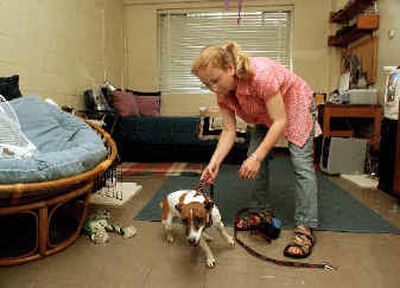Some colleges allow pets in dorms

COLUMBIA, Mo. – Since coming to Stephens College, Abbey Road is making friends with her energetic personality, intense eyes and uninhibited kisses – especially when the little dog is thrown a slobber-slick tennis ball.
The Jack Russell terrier moved in last week with owner Alexandra Geisler at the college’s Prunty Hall, where the first floor debuted as a pet-friendly zone for dogs, cats and rabbits.
“It means everything to me. I am so much happier when Abbey is around,” says Geisler, a 20-year-old sophomore from Long Island, N.Y.
While Stephens is not the first to allow pets, most colleges and universities only permit fish or small reptiles, with legally required exceptions for service animals.
Reasons for excluding pets include noise, smell, allergies and concerns about bites and scratches. And there’s a potential for neglect when the appeal of a cute pet is overtaken by the hectic pace of student life.
Animal shelters in college towns frequently take in more abandoned pets when school is out. At Stanford University, a rescue society unaffiliated with the school has been established for stray cats around campus, many of them abandoned.
But Stephens, a women’s college founded in 1833, didn’t jump into its pet-friendly experiment haphazardly, said Wendy Libby, who became president last year.
“There were lots of discussions, but students asked for this – so after the knee-jerk reaction that we cannot do it, we started talking about practical ways we could allow some pets,” Libby said.
Dogs must be 40 pounds or less. All pets must be kept in crates or cages when the student is out of the room. A fenced dog run has been built outside Prunty. And the program will be evaluated constantly, including whether pet noise is below an acceptable level.
They’re starting small. Five students are sharing space with pets in the new semester – two dogs, two cats and two rabbits. Stephens also is working with a local animal shelter to link select students with homeless pets.
“My mom was, like, ‘Are you sure you want to do this?’ But it is very well thought out and I’m going to work to make it a success,” said Bethany Dean, 19, a junior from Dallas who adopted a female Himalayan cat named Fluffy.
The cat tilted its head in curiosity, then went back to snuggling her owner as Danielle Gibbs, 19, a sophomore from Overland Park, Kan., walked by with her two rabbits, Fleur and Elphie.
“I’m excited to have the rabbits here. I am one of those people, when I’m upset, I tend to hold it back and hold it in, but I can just hold my rabbits and it calms me down,” Gibbs said.
The Delta Society, a nonprofit group that promotes welcoming pets to workplaces, says ample research backs up the notion that pets have a soothing presence. Studies have shown that visits by gentle dogs and cats to nursing homes can reduce loneliness and even lower blood pressure, said Michelle Cobey, the group’s resource coordinator.
Libby said there’s no doubt college life can be stressful.
“We acknowledge that, and we are a student-centered institution, and if this helps our Stephens students feel more at home and helps them excel, the program may be expanded.”
The Chronicle of Higher Education reported that while there is no central database of pet policies on campuses, most schools bar any pets – as do many off-campus landlords.
But at the State University of New York at Canton, the “Pet Wing” of Mohawk Hall has welcomed animals since 1996. It has two dozen pet-friendly rooms for a maximum of 48 pets and “has been a huge success,” said school spokesman Richard Fujita. If owners are around, pets are permitted to roam freely in the wing. Many of the residents are veterinary students, and the chance to bring along their pets has lured them to the school, Fujita said.
On other campuses, the rules are strict. At Case Western Reserve University in Cleveland, birds, gerbils, hamsters and nonpoisonous snakes are the only pets allowed in dorms.
Lisa Marsalek, Case Western’s associate housing director, said a rabbit was once evicted.
“It was wandering everywhere,” she said, “and you can’t have that – you know how you can suddenly have a lot of rabbits.”